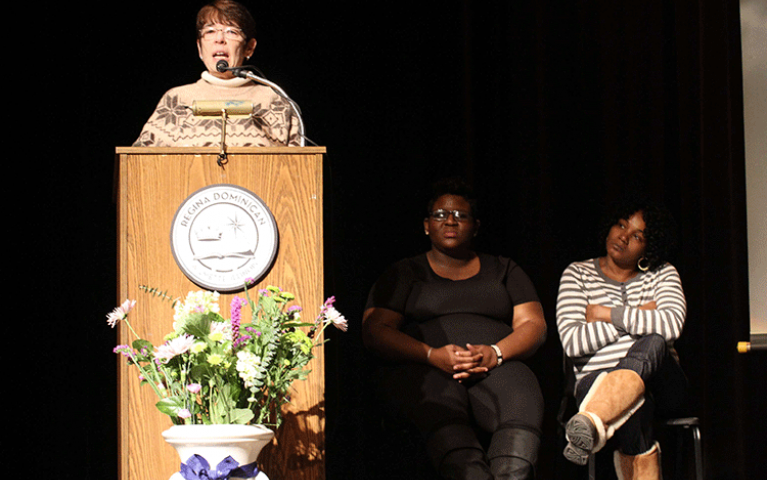Changing the World through Faith, Community and Leadership

“Living truthfully draws out our deepest humanity – and makes it possible to build a more humane world.”
This is an excerpt of a talk that our Executive Director Sister Mary Scullion gave at the Regina Dominican Leadership Institute in February 10, 2014.
Over the years at Project HOME, we have learned many lessons of leadership. First, what is clear to me is that leadership is bigger than any single individual. Leadership is not so much an individual attribute as it is a community gift. Our success is due in large measure to our development of a team of talented persons who grasp the vision and are committed to working together to achieve it.
Leadership is not only found in places and positions of power. The most dynamic leadership happens through broad-based empowerment of people in all sectors of our society. At Project HOME, we seek to create a community in which the gifts of each person are able to come forth and bear fruit. Often, we discover leadership in unexpected places. Whether we are working to defend housing rights, to develop an effective recovery program, or to design a neighborhood garden, we depend on leadership that emerges out of relationships and community. Perhaps our most important work is to identify and tap the diverse kinds of leadership that happen at many levels and in many areas of our mission.
Leadership demands that we stay in touch with our deepest values and sense of meaning. In today’s society, we are tempted to count, measure, and weigh, everything and everybody. But a hyper-quantitative world can cause us to lose consciousness of the uniqueness and pricelessness of each and every human life. We can lose sight of the powerful reality that we are interconnected, part of a whole, and that whatever affects one, affects all. I have long drawn inspiration from the famous quote of Lill Watson, an Aborginal Australian activist: “If you have come to help me, you are wasting your time; but if you have come because your liberation is tied up with mine, then let us work together.” Similarly, Project HOME has drawn inspiration from Dr. King’s words: “In a real sense all life is inter-related. All of us are caught in an inescapable network of mutuality, tied in a single garment of destiny. Whatever affects one directly, affects all indirectly. I can never be what I ought to be until you are what you ought to be, and you can never be what you ought to be until I am what I ought to be.”
During past 30 years, I have also been given the priceless gift of humor. Without a doubt, that has been one of the most treasured gifts, which has gotten us many a rough period. It keeps things in perspective; it keeps us humble when humility is required; it lightens the load and helps us to breathe when the pressure is on. It’s also often the most honest response to the situations we face!
One member of my community of Sisters of Mercy once said, “Faith doesn’t give us answers, it gives us courage.” That is a lesson we have learned over and over again – courage in the midst of adversity. As I have been privileged to work with people living with disabilities, living on the streets, struggling against addiction, coping with poverty, I have witnessed the power of courage. I have seen people living their faith – not the faith of a rote catechism, but a living, breathing commitment to recover, to grow, to develop. This is not possible without deep courage. Change comes through courage. Whether it’s an individual or an organization, we need courage to face what seems impossible – overcoming chronic homelessness, making a difference in public policy towards those who are poor and homeless.
The men and women who have lived on the streets have constantly taught me that hope abounds deep in the human spirit – and we have to know how to see it. It is honesty, realness. It is the beauty of simplicity. In fact, perhaps the most critical aspect of leadership – if not the most critical aspect of being human – is living our lives truthfully and authentically. Only in living truthfully can we avoid becoming numb and complacent in the in the face of so much suffering in our city and our world. Only in living truthfully will we be able to take the necessary risks together to house, educate, and employ all people. Living truthfully draws out our deepest humanity – and makes it possible to build a more humane world.